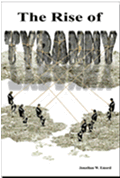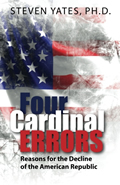SOCIOPATHOCRACY
PART 1 of 2
By Professor
Steven Yates
April 28, 2012
NewsWithViews.com
[Note: I had a version of this article ready to go online when the latest death by government, that of the late Andrew Wordes of Roswell, Ga., came to my attention.
For around 13 years Andrew Steven Wordes, 53, had lived alone in the Roswell area north of Atlanta, raising chickens in his backyard and minding his own business. He was not an isolated eccentric; he had organized a Meetup group on chicken farming and had taught seminars on the subject. A nosy neighbor, however, complained about his activities (this was in 2008). The town issued Wordes a citation for having too many chickens on his property, which he challenged in court and was able to have dismissed as frivolous. Town officials do not like having their decrees thwarted, of course, even when misapplied: the ordinance used against Wordes had specifically excluded poultry from its provisions.
The officials retaliated by initiating a campaign of terror against Wordes, who stood his ground valiantly. They literally rewrote the ordinance. A judge ruled that Wordes would be "grandfathered" under the previous version. The battle escalated. Town officials again retaliated by invoking the city’s “2030 Comprehensive Plan” which enabled them to reclassify Wordes's property as "green space" (an Agenda 21 derived concept). Wordes, incidentally, described himself on his Facebook page as a “Constitutional Conservative; I believe in G*d, Guns and The U.S. Constitution. My G*d and my guns will make sure the Constitution is obeyed.” Such statements plus a lifestyle bespeaking of independence and self-sufficiency invariably set authoritarians’ teeth on edge. Local media, meanwhile, had begun making light of the situation by referring to Wordes as the “Roswell Chicken Man.”
The town had neglected to maintain storm water infrastructure in the vicinity, resulting in a damaging flood. Wordes took matters into his own hands by grading his own land with a Bobcat. The city issued him a citation for grading his land without a permit, for having too many cars on his property, and again for having too many chickens. Wordes' attempted to file a FEMA request for assistance; the town refused to cooperate. The Roswell Police Department began watching him, parking at the end of his street, looking for anything they could cite him for, actually taking pulling him over several times for such minor offenses as having a broken taillight in one case. His mortgage holder (an 80-year-old woman) was bullied into selling the mortgage on his property for pennies on the dollar. The new mortgage holder immediately began foreclosure proceedings, and the town then filed a 55-page civil lawsuit against him attempting to have the property declared a “nuisance.” His property was then vandalized while he was at a political meeting; his chickens and other birds were poisoned, costing him his primary source of income. Wordes believed the poisoning was the work of the neighbor who had filed the initial complaint. He filed a police report, which was never seriously pursued.
Finally
Wordes was jailed for 99 days for refusing to comply with the city’s
order to reduce the number of chickens on his own property. While Wordes
was in jail, the city vindictively pronounced his property “vacant.”
This was an open invitation to further vandalism. Firearms, ammunition,
and other valuables were stolen by parties unknown (this, too, was never
pursued).
In jail he was refused his right to review personal records and have
legal counsel pursuant to a bankruptcy hearing that would have halted
the effort to foreclose illegally on his property. He was released only
to discover that it was too late. He had no more money, no legal representation,
no means of earning a living, no means of fighting the illegal foreclosure
proceedings taking place, and was in an unlivable house.
In February he was able to obtain interview time about his situation on a local radio show where he appealed for help. He needed a property attorney who wouldn’t want upfront fees worth an arm and a leg, as he was facing eviction from the property but was too broke to continue fighting malicious city officials. He held on nonetheless. Finally, on the morning of March 26, Fulton County marshals assembled to force him out of his house, in typical police-state fashion. A standoff ensued. Wordes phoned a local reporter who showed up at the scene. Speaking through him, Wordes urged the marshals to leave his property. Needless to say, they refused. Moments later, there was an explosion inside the house, which burst into flames. Wordes's body was found later amidst the smoldering ruins.
While Wordes’ death was officially ruled a suicide, the final act of a man driven over the edge by ruthless city and county officials. Another death by government on U.S. soil, in any event. How many more Andrew Wordeses are out there, being harassed to the point of taking lives, either their own or that of others, by sociopathic government officials? Also: here is hard proof that local officials are not necessarily to be trusted any more than federal ones; they are potentially worse because of the invisibility, on a large scale, of their acts of sadism and destruction. Moreover, mainstream media is not going to report these events. This battle began in ‘08-‘09. I only heard of it two weeks ago!
Is sociopathic too strong a word to use for town and county officials who would set about to utterly destroy a man’s life, knowing full well what they are doing and continuing anyway? Here is the most complete account I have found of the Andrew Wordes case. But read on!]
Two recent articles by Doug Casey, the investing and financial planning strategist who founded Casey Research, probably qualify as Keepers (they are here and here) Every American ought to read these articles and print copies for future reference.
Begin with Pareto’s Law, the infamous 80-20 principle which says that 80 percent of the work in any organization is done by 20 percent of its people. Twenty percent of a sales force achieves 80 percent of its sales. Likewise, 20 percent of any population is responsible for around 80 percent of its crime rate. In my experience in the classroom, I would estimate that approximately 20 percent of students accomplish 80 percent of whatever is accomplished in one of my philosophy classes. I wouldn’t be surprised if 80 percent of all advances of Western civilization can be attributed to 20 percent of the population. The rest are just along for the ride.
Pareto’s Law, according to Casey, has applications in social ethics, and personal motivation. Eighty percent of us humans are basically decent and mean well. Even if we sin, we are not overtly malicious and will not purposefully harm others except to defend ourselves and our own. We have an inner moral compass that checks our behavior, at least most of the time.
The other 20 percent lacks this moral compass. Most of this other 20 percent act benign most of the time. They don’t torture animals, for example. They don’t go out of their way to look for trouble, and if no opportunities arise, they won’t act differently from the 80 percent. But in the last analysis they are opportunists. They identify with authority. They are attracted to occupations and positions that allow them to wield unchecked power over others. They may work to gain your trust, and then stab you in the back when you become an inconvenience; they will enjoy having done it.
Have you ever wondered where the TSA finds the thousands whose job description involves treating their fellow citizens like potential terrorists? Or where the Fullerton, Calif. police department found the men who beat, kicked and Tasered a mentally retarded homeless man to death last summer? Or, for that matter, why our nation, with the largest percentage of its population incarcerated of any advanced nation in the world, seems to have little trouble staffing its facilities? I sometimes read about shortages of nurses. I never hear about shortages of prison guards.
Of the opportunistic 20 percent, 80 percent of its number is checked by social norms and others’ expectations most of the time. Not every TSA agent is looking to humiliate someone, for example. I’d wager, around 80 percent are not. Not every cop or prison guard is a sadist. But 20 percent of the opportunistic 20 percent are the truly bad apples, Casey writes. These are the people truly drawn to power, and will use opportunities to abuse others to advance their interests. They are capable of killing without remorse. Some, indeed, are evil through and through. Twenty percent of 20 percent being four percent of the whole, this means four percent of any population qualifies as sociopathic.
Casey lists seven key characteristics of sociopaths. He didn’t invest this list. I’ve seen variations on it elsewhere. Based on my own experiences and observations I’ve reworded it for this article:
(1) Sociopaths have no conscience or sincere empathy with others. They are fundamentally conniving, and will lie without hesitation to achieve their goals. They have no qualms or regrets about having hurt others. They can, of course, pretend they do. Some are very good at this. They may, however, exhibit Jekyll and Hyde personalities, being charming in public but flying into rages behind closed doors. The shallowness of their emotional lives makes love impossible. They are capable of marriage as they can pretend; but then ruin their spouse’s life, and that of any children involved.
(2) Sociopaths believe their wants are a completely different level from those of others, and will use or step on others to get what they want. They believe the ends justify the means. As we just said, they will kill to advance their goals or to protect their interests if they believe they can get away with it.
(3) Sociopaths see themselves—implicitly if not explicitly—as superior, because they don’t have “emotional” or “juvenile” ethics problems. They’re above all that, beyond good and evil. Again, though, they can pretend, and sound very convincing.
(4) Sociopaths are unable to accept responsibility if things go wrong. They never apologize for anything.
(5) The sociopathic notion of property rights runs something like this: what’s mine is mine, and what’s yours is mine, too, if I want it. They will defend government (or anyone else’s) measures that seize other people’s property if they believe they will reap benefits.
(6) When disaster strikes, sociopaths in power become unhinged and lash out with an attack against the wrong target. Example: Bill Clinton would order an overseas bombing to detract attention from whatever trouble he was in over here (lying under oath to a grand jury, in one instance). Example: 19 Saudis are blamed for flying planes into the Twin Towers on 9/11. The Bush II regime attacks Iraq.
(7) Sociopaths enjoy bullying and inflicting pain on others. They will spread libelous rumors, and for sport will pass off unfounded allegations as true in order to hurt someone they regard as a foe. This is particularly true in ideological quarrels, although sociopathy itself knows no ideology.
| Subscribe to the NewsWithViews Daily News Alerts! |
In a healthy society, the sociopathic four percent finds itself marginalized—these are the people seen by the rest of society as “no good.” They’ve lied, stolen, double-crossed, or in some other way proved to those around them they can’t be trusted. Their fellows eventually refuse to have anything to do with them. They often end up in the slammer. In the America of decades past, of course, all towns had such people. Everyone steered clear of them. Parents instructed their children to stay away from the sociopath’s kids, if he had any. For part two click below.
Click here for part -----> 2,
� 2012 Steven Yates - All Rights Reserved













 Share
This Article
Share
This Article





